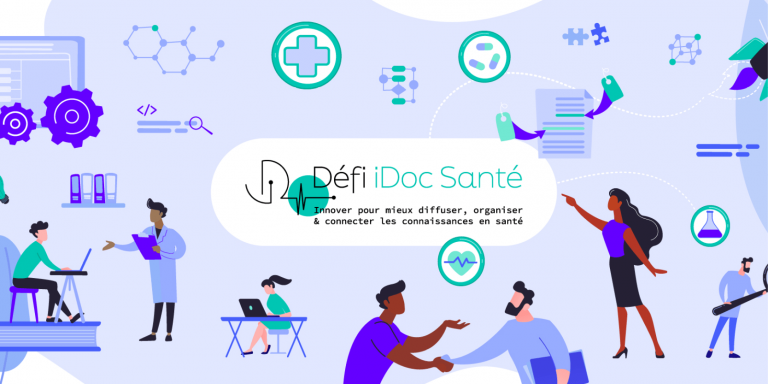
Last April, the French National Authority for Health (HAS), the French National Cancer Institute (INCa) and the French Digital Health Agency (ADA) launched the iDoc Health Challenge, which aims to improve access to, and the dissemination and use of, health-related knowledge. The partners invited healthcare professionals, patients and specialists in knowledge exploitation and management to take part in this challenge, which ended with a ceremony at PariSanté Campus on October 5, during which the six teams in the running presented their work to the jury.
Medical data is becoming more and more numerous and is accumulating rapidly, and health authorities are making sure that it is made available in the form of opinions, recommendations, authorizations, etc. However, although the documents produced are freely accessible, their dissemination and reuse encounter various obstacles, thus limiting their impact.
As part of its “2021-2024 data strategy”, the French National Authority for Health (HAS) has therefore joined forces with INCa and the French Digital Health Agency (ADH) to make more effective use of the textual data produced by the HAS and its partners, for example to make the link between a particular clinical situation and the knowledge to be mobilized, or to materialize the impact of a new publication on the existing body of knowledge
Seven challenges grouped into two families
Seven challenges were proposed to the participants:
Creating links between documents
This first family of challenges aims to enable new functionalities for navigation, exploration and consultation of reference documents.
- Challenge 1.A: Identify the paragraphs of reference documents relevant to a clinical situation;
- Challenge 1.B: Impact of a new publication on the existing corpus: use case of a new opinion from the Commission de la transparence;
- Challenge 1.C: Linking a PCR (multidisciplinary cancer consultation meeting) form to the correct good practice document.
Structuring medical knowledge
This second family of challenges aims to propose methods for representing knowledge about health products to facilitate the work of health professionals.
- Challenge 2.A: Position medical devices (MDs) in relation to all the knowledge objects produced by the HAS;
- Challenge 2.B: To position medicines in relation to all the knowledge objects produced by the HAS;
- Challenge 2.C: Develop an indicator of the complexity of prescribing, dispensing or administering a drug to identify situations in which support from an IT tool is desirable;
- Challenge 2.D: Equivalence between drugs.
The winners of the challenge
Of the six projects in the running, three were selected and awarded prizes:
- Special jury prize for the DispoMed team
- 1st prize for the Derek team
- 2nd prize for the Vera team
The Dispomed team chose to tackle Challenge 2A: “Positioning medical devices in relation to the body of formalized knowledge.” Made up of two pharmacists, a dermatologist, a data scientist, the Director of Information Systems at Vidal and a journalist from the pharmaceutical trade press, the team’s project is to create a site, or even an application, to describe, store, use and report on everything related to medical devices.
The Derek project was merged, the team presented the ONCORECO project which answers the 1C challenge: “Linking a multidisciplinary consultation meeting (RCP) form to the right document of good practice”, led by a team composed of doctors, experts in automatic language processing and a project manager. Their objective: to enable oncologists to find the latest recommendation for cancer treatment, and then to identify the pages of the document that specifically concern the clinical situation they are facing.
The members of the Vera team, which includes pharmacists and data engineers, have opted for challenge 2B, “Positioning drugs in relation to the formalized body of knowledge”. To this end, they want to develop an interface that presents in chronological order all the documents related to a drug, classified by theme. This would allow health professionals to have access to all the reference documents concerning a drug as soon as they are published.
Translated from La Haute Autorité de Santé dévoile les lauréats du Défi i-Doc Santé









